You may not even realize it, but chances are good that you eat at least one thing that’s terrible for your heart on a daily basis.
The human machine was created to run at its best when fueled by optimal nutrients. Our ancestors lived this, but we’ve gotten so far away from the foods that they ate that they wouldn’t even recognize ¾ of the foods on the shelf today.
One in FOUR deaths in the United States is caused by heart disease! Nearly every single case is caused by one of three things, or a combination of them; poor eating habits, lack of exercise, and chronic stress. Reducing all three of these reduces your chance of dying from heart disease to almost nil.
Many foods directly damage your heart while others create other health issues that will then affect your heart. For example, sugar isn’t bad for your heart, but if eaten in large quantities, it causes obesity, which then damages your heart. Some of the foods that we’ll discuss today may seem like no-brainers, but others will surprise you.
Trans Fats
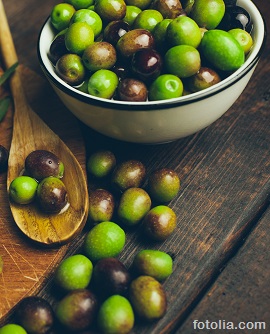 Originally created as an alternative to that horrible, evil substance known as butter, (note sarcasm), trans fats have now been proven to increase bad (LDL) cholesterol while decreasing good (HDL) cholesterol.
Originally created as an alternative to that horrible, evil substance known as butter, (note sarcasm), trans fats have now been proven to increase bad (LDL) cholesterol while decreasing good (HDL) cholesterol.
There are several types of fats: trans fats, saturated fats, polyunsaturated fats and unsaturated fats. Unsaturated fats typically have the least impact on your cholesterol levels.
Your body needs fats in order to survive. For example, omega-3’s found in olive oil, fatty fish, coconut oil, nuts and seeds is an essential nutrient that your body can’t produce but still needs in order to preserve heart and brain health.
Typically, saturated fats (with the exception of coconut oil) should be consumed in limited quantities. Trans fats should be avoided altogether. No good comes from it.
Foods that you should avoid eating or stockpiling because of their trans-fat content include packaged baked goods and icings, packaged cookies, hot dogs, canola oil, margarine, processed fried foods, shortening, biscuit mixes, microwave popcorn, non-dairy creamer and “butter” crackers.
The upside here is that if you’re canning whole foods and are attempting to stockpile foods and meats that you grow, you’re avoiding trans fats without even realizing you’re doing it.
Refined Grains
Foods such as white flour and instant rice have been refined to the point that all of the healthy ingredients that provide valuable vitamins and minerals have been removed. These foods have zero nutritional value, with the exception that some of them have vitamin D or calcium added back in.
Some foods in this category include white bread, bagels, pasta, flour tortillas, biscuits (yeah, it kinda hurts my southern heart to say that – pardon the pun) and pie crusts/pastry crusts. Instead, use products made with whole grains and switch to long-grain brown rice.
Like sugar, refined grains don’t directly harm your heart but they don’t provide any nutritional value. On the flip side, whole grains provide fiber that’s known to reduce your risk of heart disease by keeping you fuller longer, which helps you control your weight. Fiber also helps lower cholesterol, which DOES directly decrease your risk of heart disease.
In other words, by replacing heart-healthy whole grains with processed ones, you’re cutting a vital part of heart health from your diet. Make the switch back to the good stuff.
When stockpiling, any type of whole grain will store for years without losing hardly any nutritional value. One tip, though: once you grind it, you need to use it within a week, maybe two, because it goes rancid once you release the oils in the kernels.
Sugar
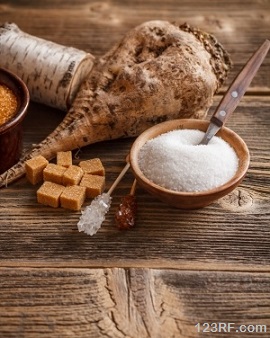 Yes, your body needs glucose to function; most metabolic functions depend on it for energy production. Strictly speaking, sugar isn’t bad for your heart in normal quantities.
Yes, your body needs glucose to function; most metabolic functions depend on it for energy production. Strictly speaking, sugar isn’t bad for your heart in normal quantities.
However, when you compare a lollipop, which is pure, refined sugar, to a peach, which contains natural, fibrous sugar, the nutritional values aren’t even on the same planet.
Refined sugar has zero nutritional value. I don’t care how many people say that candy gives you a nice energy pop to help you get through the day.
I contend that eating a piece of fruit will give you that same energy, but will provide it in a steady stream for a few hours because the fiber in the fruit slows the digestion of the food and thus the delivery of sugar to the blood stream.
Refined sugar has been shown to be actually physically addictive. People who are used to eating a lot of sugary products on a daily basis suffer side effects such as hard-to-resist cravings, fatigue, headaches and other symptoms until the body adapts to the lack of sugar. It’s quite literally a drug.
When combined with trans fats, as is the case with candy bars, commercial ice cream, and baked goods, all you’re getting is empty calories and fat that will make you fat, increase your odds of developing diabetes and other metabolic disorders. These conditions all lead to heart disease.
From strictly a health standpoint there’s no need to stockpile anything that has no nutritional value just so that you can meet your caloric input for the day. There are many other ways to get the sugar that your body needs without storing back junk food. For instance, instead of candy bars, stockpile healthy granola bars that you can make yourself at home with just your choices of fruits, nuts and honey.
If you buy canned fruit to stockpile, make sure that it’s canned in fruit juice instead of syrup; juice is high in calories but it also provided nutrients such as vitamin C, unlike syrup that has no nutritional value whatsoever.
Fatty Meats
If you’re a meat eater, and I am, then steak is delicious. However, fatty meats raise your cholesterol. This doesn’t just apply to red meat; chicken skin and pork fat are bad for you too. The reason why is because it raises your bad cholesterol, which causes atherosclerosis, or hardening of the arteries. This, of course, causes heart disease.
When you’re storing meat, especially if you’re dehydrating it, you want it to be as lean as possible because fat goes rancid fairly quickly. You need to cut the fat, literally.
When canning your meat, trim the fat off and try to use leaner meats such as venison. When you can chicken, do so without the skin. Of course, it’s fine to keep some of that fat so that you can make gravy, etc.
I’m not saying that you have to cut the fat completely out of your diet, but you should limit your consumption of the bad stuff. It will kill you slowly, but certainly.
Energy Drinks
This one is painful for me too, because I’m a huge fan. However, the mix of “proprietary blends” found in most of them contain such ingredients as taurine, caffeine, ginseng, B vitamins, guarana and sugar all work together to give you a quick energy boost but it also raises your blood pressure for a couple of hours after you drink them.
This may be fine occasionally as long as your heart and your blood pressure is healthy, but if you drink them chronically or if you have high blood pressure or heart disease, energy drinks can be harmful to your heart.
Salt
Salt is literally what keeps your blood volume up so that it can pump through your veins in a healthy manner. Stated very simply, it regulates your blood pressure. Too much salt, or if your body can’t regulate salt properly, and you’ll have high blood pressure.
Of course, if you already have high blood pressure caused by medications, atherosclerosis or other cardiovascular issues, you need to limit your salt intake.
Your body needs salt; it’s a mineral essential to your survival. However, you don’t need TOO MUCH salt. When you’re stockpiling, watch the levels of sodium in your foods. You can do this by canning or storing natural foods instead of processed, boxed foods.
Top Foods that Are Bad for Your Heart
OK, so in a nutshell, there are foods out there that you should avoid if you want to keep your heart healthy.
If you notice, these foods contain a combination of three or more of the ingredients that we just discussed. You don’t necessarily have to cut them completely out of your diet but eat them as a rare treats rather than as dietary staples.
- Pizza
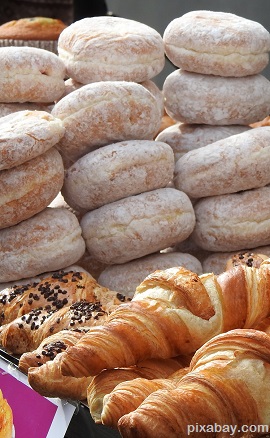
- Doughnuts and pastries
- Baked sweets such as cakes and pies
- Fatty red meat
- Chicken skin
- Breaded foods
- Fried foods
- Ice cream and other frozen treats
- Pudding
- White bread
- Pasta
- Cream Sauces
- Sugary drinks
- Condiments such as mayonnaise, salad dressings and ketchup
Heart Healthy Substitutions
There’s no reason to sacrifice flavor in order to stay healthy. Instead of using creamy, processed salad dressings, use olive oil and vinegar, seasonings or lemon juice. Have a well-seasoned skinless chicken breast instead of country fried chicken. Have a filet instead of a ribeye or, if possible, eat venison or another lean red meat instead of beef.
Instead of a bowl of ice cream, have some fruit. Trust me, it WILL kill your sweet tooth. Instead of slathering your sandwich with mayo or ketchup, use mustard or oil and vinegar.
Your heart health will be critical in a survival situation. Not only will it help you if you need to run, maintaining a healthy heart now will keep you off medications that may not be available if SHTF. Plus, there’s the obvious benefit of living longer, and none of us will argue against that benefit!
If you have something to add to this list, please feel free to add it in the comments below.
This article has been written by Theresa Crouse for Survivopedia.



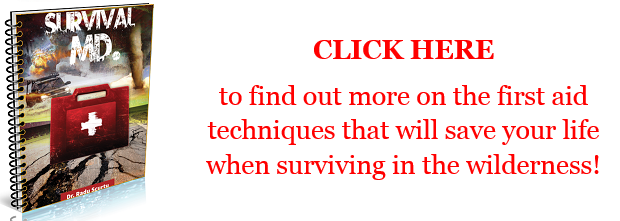


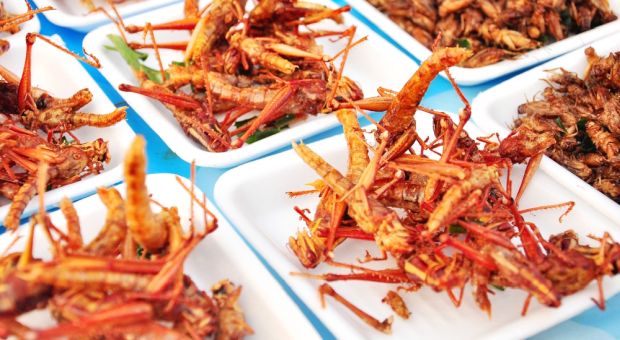
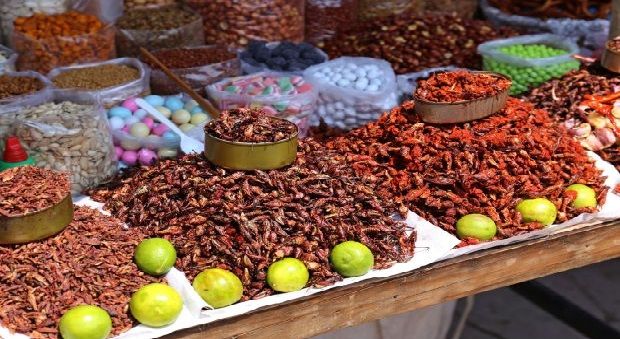

Pingback:6 Top Foods That Slowly Kill Your Heart - Survivalot | December 3, 2015
|
Pingback:6 Top Foods That Slowly Kill Your Heart | Prepper's Survival Homestead | December 3, 2015
|
Patricia ackerman | December 3, 2015
|
We use coconut oil, olive oil and peanut oil, organic of course. prefer to make my own mayo and ketchup, both store well. Can our own food for use and prepping. Store bought is nasty, has to much garbage you can’t pronounce let alone want to eat. I grew up on organic food and raw milk straight from the cow and at almost 68 years young I have no need for meds or anything else to keep me going. Those in my family that started eating processed foods have since died from cancers, heart problems and diabetes. I don’t think people read enough labels.
EASTOFAUSTIN | December 3, 2015
|
Last week, I saw an article that said despite conventional wisdom, for long term storage, choose white rice, not brown rice, because the natural fat in brown rice will cause it to turn rancid while white rice will store indefinitely is properly sealed. I’m confused. Advice?
Jackieh | December 3, 2015
|
I heard the same thing and have been told numerous times not to store brown rice for long term storage. I have to tell you though that I did it anyway and have had no problems with it going rancid. When I store it I use oxygen obsorbers in it though and store in glass jars or mylar bags. I have opened some that I have had for 5+ years and it has been fine. You need to be sure to rotate your food though. Using it before 5 years would actually be better. I just had that bag that someway got overlooked on my rotation. Another option is canning it. I watched a video on youtube not to long ago and am going to do some of my rice that way.
jason | December 3, 2015
|
In Chinese medicine brown rice is also considered difficult for the body to digest. White rice is always preferred. Asians have been eating it for breakfast, lunch & dinner for centuries without any problems. Further, starches are the preferred food, and should be our staple, while eating mostly veggies around it. Meats/animal products and healthy fats (eg, olive oil, macadamia oil, coconut oil, palm oil) should be used sparingly. Metabolic problems can arise when we combine starch/sugar with heavy fats (think donuts, pizza, hamburgers, hotdogs, fried foods, etc.). The starch & fruit (and even sugar) are not the bad guys. It’s really all the fats/oils that have been problematic. If you eat animal products and/or fats, it is best to eat them with non-starchy veggies (eg, in salads).
Starches are the favorite food of our gut flora (microorganisms), which is why you can virtually live on it alone. When you feed your gut flora you get back much more in return in terms of nutrition (eg, vitamins, enzymes, critical neuropeptides, antioxidants, immune-regulators, etc.). Starches are also cheap, easy to grow, they fill us up quickly, keep us satiated for a long time, provide a clean-burning source of energy, and are a good source of nutrition (even protein & essential fatty acids). Common sources of healthy starches are potatoes, sweet potatoes, cassava/tapioca, squashes, grains, and legumes & beans. Green (unripe) plantains & bananas also contain a type of starch called “resistant starch” which is considered a super food for our gut flora. You can get resistant starch also by cooking, then cooling, potatoes and white rice.
todd | December 3, 2015
|
Actually, fatty meats from good quality meats are best, by good I mean grass fed meats from your local farms not the factory farmed meats that are injected with hormones/antibiotics and fed gmo or even organic grains. There is plenty of studies and evidence at this point that show fat, saturated especially, does not cause heart disease. Also, there is much more to the story on cholesterol, which is a major hormone regulator in your body, as far as hdl vs ldl (particle size actually is more important here). Throughout our history most cultures have prized the fatty parts of the animal as well as the organ meats. Our body is designed to burn fat for energy (not carbs) as the energy from fat burns slower while giving you more energy so you can go longer between meals (think winter and colder climates with less carbs and food available). Remember we didn’t always have whole foods down the street and ate seasonally with what was available around us. For example, the Inuits of Canada were some of the healthiest people studied and their diet consisted of ~70 – 80% fat intake. So it’s not the fat in the meats that is the problem, its the ratio of nutrients in the animals that are studied (usually factory farmed) as well as the oils they are cooked in (vegetable oils like canola). Neither of which the studies that claim red meat is bad ever differentiate or attempt to control for.
Vicki | December 3, 2015
|
It is true to eat lean meat, however, without the right FAT to go with it, it can also make you sick! Look at the example of the original Native diets, and you will be well on your way to knowing what is better to eat, and in what balance. The mixture of berries, fats etc, is a very good process to survival food that is also good for you. One has to be careful of ‘survival mode’ vs ‘food storage for a year or more mode’. Having both sets of food storage items is a good thing. Also remember that having a BIT of sugar is also a comfort food in difficult times or situations. That comfort is a mental well being state that adds value to surviving in the first place. Take that away, and you can loose your mental ability to even want to survive, never mind any health issues.
Another product not mentioned here that is good for the heart is honey and the by products of honey such as honey pollen. The pollen has been proven to not only help prevent cancer, but to actually stop tumor growth! It has ALL the minerals and vitamins in it that the human body needs…which is unlike any other source on earth! It cannot be duplicated in any lab. It is a great product to put into any storage situation that lasts, (and honey NEVER goes rancid!!) not only that but the barter and trade value in honey is through the roof! Long time standard of any pioneer, knew the value of honey, having it, and that it also helps keep you healthy and is a natural medicine/anti oxidant that is good for you.
One might want to support the return of bees knowing that info.
Anyway, with my own health situation, exercise is also a huge key in heart health. Please remember that in winter months. Very hard in places like Canada to go outside when it is -25 with wind chills of -35 or more. Yup, I know that one!!
If you do not have access to venison, try Buffalo meat. That is very lean, and also very good for you, and you can smoke it to last a very long time. Also, for dried meets, do more fish! The omega 3 in fish products and the good fat is a perfect food. Again, look at the natural native diet before the white population and others got a hold on lives. Go back to canning and processing your back/front/patios/roofs/balconies into gardens. That will not only save many species that would be lost in the next 50- 100 years, but ourselves as well.
Fruit juices can have TONS of sugar, be sure it is the kind a diabetic can drink! Read labels carefully, as synthetic sugar is also not good for you.
White rice does not have food value that brown rice does, but it is better than no rice at all. If you save any grain into storage, do it in TINS…that are sealed, those will last years, even brown rice. Although I have noted in our storage processing situation, white rice is still used for long term storage. I have used rolled oats, quick oats as well that have been stored over 30 years. Product was fine, no food loss and it tasted perfectly fine. It was stored in sealed large tins with a moisture pack inside. Nice to know these things do work! Also, army rations (which today are wonderful products and are perfect for those 72 hour plus kits!) last and taste really good! I know, I have tried those too, and use them for camping as well. Anyway, keep healthy, thanks for the great article, and don’t forget to store all kinds of berries. Blue, black, red, etc…rose hips etc. All great for heart body health.:)
Happy Prepping!!:) And remember ONE THING…FEAR is the MIND KILLER…do not let any enemy get you with fear, as then you have lost more than just your way of life, but your life period. Fear is a very poor long term motivator. WE do not need to fear anything or anyone…all we need to do is live the laws of unconditional love, and we can defeat any bad situation. Corey Ten Boom learned that in Holland in the Second World War from her own sister. Mahatma Gandhi also lived that law. Tyrants may rule for a time, but in the end, they are defeated. Let us live our lives in joy and in abundance, faith, knowledge and progressively moving toward saving this world, not losing it to war, hatred, and lack of caring of what we are loosing with our bad stewardship. We can and have the power to make a big difference. The choice then is….when are we going to start? Our good health is a place that brings energy and productivity to the table, so we can run and not faint, and stand in the winds when we need to, instead of crumbling like a house of cards and expecting others to do what we should have done. What legacy do we want in the end?
K. going now…just my Canadain two cents:)
Joseph Daugherty | December 3, 2015
|
I didn’t think I could live without certain foods. I hated water and only drank diet colas for years. I thought Hellman’s/Best Foods mayonnaise was something else I could not live without.
But I discovered that once I forced myself to drink only water that after just a few short weeks I could tolerate carbonated or sweet beverages of any kind.
I also discovered that I could substitute plain non-fat Greek yogurt for mayonnaise and sour cream. Even my adult son could not tell the difference when I used yogurt to make things like potato salad or put it on his sandwiches along with mustard.
My blood pressure dropped to normal. (I was on two prescription medications to help control my high blood pressure and another one for my high cholesterol. Best thing about all this is I have been drinking the water and using the plain non-fate yogurt as a mayonnaise substitute for 14 year now and I take no medications for blood pressure or cholesterol and haven’t for the same 14 years… and I am 63 years young! I also use olive oil in place of butter or margarine and my son can’t tell the difference with that either unless he catches me and only then does he swear he can taste the difference.
I never was a big sweets eater. I was more of a ‘carboholic’ enjoying breads, pizza, pasta and those sorts of things. It truly is amazing what you can do without or substitute when you just try it for awhile.
My son talked me into buying $28.00 worth of discounted Halloween candy when it went to 75% off. For the first time in my life I found myself eating handfuls of it for about two weeks before I realized I was just addicted to it… yes, just like a drug! I quit and after a couple of days the cravings went away.
1. Filter your drinking water.
2. Avoid processed sugar and eat fruit in moderation.
3. Trade mayonnaise and sour cream for plain yogurt.
4. If you must eat meat, reduce your intake and opt for chicken boiled (yuck) or baked in the oven. You can remove the skin, rinse with water and coat it with something healthy as a healthier alternative to fried chicken. Eat salmon and tuna. Even canned tuna and salmon are very good (packed in water.. not oil) and they store for years!
5. A great way to get a variety of vegetables and color in your diet is; Into a pan, throw a bunch of tomatoes, onions, greens (spinach or kale are my favorite), mushrooms, bell peppers and anything else that is a fresh vegetable and fry quickly with olive oil and put it on a half of a baked potato (I cook my potato under a small bowl on a plate in the microwave) and make that your meal. I can eat that several times a week.
Just make changes one at a time and you will be amazed at how quickly your taste buds will adapt and how much the flavors of the fruits and veggies are all you need without al that salty seasoning.
6. Use Cayenne pepper in place of salt.
7. Lemon, lime or any citrus fruit makes a great dressing by itself for salad and meats.
8. Add fruits, nuts and berries to your salads. They look beautiful and you know all that variety of color is healthy too!
9. You have to treat yourself every now and then. I never buy a big bag of chips even if they are on sale for 99 cents because I will eat the entire bag in one sitting. Opt for the snack size… even if cost more.
10. Learn to cook at home. It really is easy to cook. You don’t need all those ingredients they show you on those cooking shows. Keep it simple. Even beans and rice with no seasoning tastes good to me.
Pingback:6 Top Foods That Slowly Kill Your Heart | TheSurvivalPlaceBlog | December 4, 2015
|
ChuckInBama | December 4, 2015
|
OMG !!!!
I’m dead already !!
Trudy | December 5, 2015
|
Actually the worse thing you can eat is sugar, carbohydrates and vegetable oils. There was never good science behind animal fats causing high cholesterol. In fact lard, coconut oil,and butter are 3 of the best fats around. If you do not eat enough fat your liver will make cholesterol and not the good kind. That is why people on extremely low fat diets can have worse cholesterol problems than someone eating a low carb high saturated fat diet. We need cholesterol in our diets, eggs were another myth that were bad for you, turned out not to be so. If you are diabetic wholegrains are just as bad as refined grains, test your blood sugar after eating them, it goes up just as high as if you ate refined carbs. Like others have said look at the diets of native peoples and our ancestors, sugar was a rarity, diet was mostly meat, fat, some vegetables and some fruits. Think hunter gatherers. Trans fats are bad but look how many decades margerine and shortening were promoted as heart healthy, butter and eggs as bad. The research has now completely done a 180 on this nonsense. I am an Advice Nurse in mainstream healthcare and we are finally telling people what I have known for years, saturated fats are not bad unless you are consuming them in conjunction with a high carb diet this will lead to heart disease and diabetes. Yes, fruit is healthy as are whole grains but only in limited amounts. If you want to be healthy your carb intake should be less than 100 gms daily and those carbs should come from green veggies, some fruit, some whole grains. Read lables and start adding up your daily carb intake for most people it will be over 200 gms daily leading to chronic inflammation, insulin resistance and diabetes. Vegetable oils also lead to chronic inflammation. They came about with the entire saturated fats are bad nonsense, no research at all to support this myth. Our ancestors never ate vegetable oils except for island people consuming coconut and palm oils which have higher saturated and monosaturated content. Vegetables oils used to fry foods at high temperatures create carcinogens where coconut oil and lard do not do this as readily. I eat plenty of staurated animal fats, I only eat full fat mayo, sour, cream, butter, etc. My cholesterol levels are great, my sister who is thinner than I am, in fact she is downright skinny, eats low to no fat everything, she does not eat hardly any any animal fat, eats a lot of whole grains and a fairly high carb diet and “heart healthy no trans fat margerine”. She has terrible cholesterol numbers and had to start taking a statin drug. I tried to tell her for years that she is doing the exact opposite of what she needs to do but she has totally bought the main stream low fat diet as heart healthy and can not be swayed.
jason | December 5, 2015
|
Carbs (particularly the starches), in any amount, have never been scientifically shown to be deleterious when eaten alone or with other veggies & fruits. Dr. McDougall, who wrote a book called “The Starch Solution”, has helped many people reverse their diabetes, lose weight, eliminate CVD, and so on all by simply having them convert to a starch-based, high veggie diet away from oils & high fats. It is basically a low-fat, vegan diet…but one that emphasizes STARCH, rather than mere veggies & fruits (which provide good nutrition, but fail to satiate well or provide good, sustained energy). Many vegans fail because (1) they don’t emphasize starches, and (2) they consume excessive fat/oils. They may also not be addressing omega-3 & B12 needs.
Omega-3 PUFA’s and B12 are essential, but adding dietary cholesterol and/or saturated fat is not…which is why even vegans (who eat excessive plant oils/fats) can exhibit elevated cholesterol & triglycerides. Further, what is deemed “low” or “high” cholesterol has never been scientifically substantiated to be a causative, or even major factor in heart attack risk (there are many other factors & metabolic markers of greater impact). In fact, well over half of of all heart attack victims had cholesterol levels deemed to be in the “normal” range. If cholesterol is elevated, it is now considered a protective measure to address inflammation/lesions in the vascular (particularly the arterial) system. So taking a statin would not only be counterproductive, but dangerous (not to mention the numerous serious side effects they have, such as nutritional malabsorption, diabetes, low CoQ10, cognitive decline, muscle injury, risk of heart attack, stroke, etc.). It would be like trying to kill the flies in order to eliminate the garbage. It is a symptom of a bigger issue…but it is not the cause. Statins are not surprisingly an extremely lucrative source of profit for big-pharm.
One should view the following video by Dr. Greger on the real reasons why some vegans (and vegetarians) can show signs of CVD, and even have a heart attack (hint: it involves omega-3 & B12 deficiencies, which is common even in meat eaters). His research & conclusions are entirely science-based…not popular opinion. Perhaps the take-away message in his lecture is this: (1) Whatever you decide to eat more of, make sure you protect yourself with a good source of omega-3 and B12…and I would also add magnesium & vitamin C as further protection to the heart, (2) meat & dairy consumption is not essential for optimal health (with few exceptions for some unique people), and (3) heavy fat consumption (from either animal or plant) is not only non-essential but counterproductive.
https://www.youtube.com/watch?v=q7KeRwdIH04
If you eat meat, a little healthy fat, just like protein, goes a long way…similar to the manner in which Asians sometimes add only a small amount of meat to their predominant rice & plant food meals (mostly for flavor)…and virtually always eating their meals with fermented veggies. For MOST people, a starch-based, high veggie & fruit, low-fat diet is likely optimal…just as potatoes provided robust health to the Irish, yams to New Guinea natives, grains to Central & South American natives, grains/beans/legumes to Mediterranean and Near/Middle East cultures, rice to Eastern cultures, and so on. These diets are/were all low in fat, and high in starches, veggies & fruits. Starches are very satiating, provide both quick & sustained energy, are cheap, and are the PRIME food for the gut flora. There’s a reason it’s called “comfort food”.
On dairy, it is interesting to note that nations that consume the most dairy have the highest rates of osteoporosis & bone fracture. 12 additional findings on the health impact of dairy consumption are listed here.
http://nutritionstudies.org/12-frightening-facts-milk/
And here, Dr. McDougall’s discusses the myths & facts on the diet & health of Eskimos.
https://www.drmcdougall.com/misc/2015nl/apr/eskimos.htm
For vegans, the best sources of omega-3 PUFA’s are flaxseed, pumpkin seeds, walnuts, certain exotic seeds, and some species of sea algae. In fact, Dr. Brian Peskin, a meat & dairy advocate, has acknowledged that PEO’s (Parent Essential Oils) found ONLY in plants are the best forms of omega-3 & 6…for these are converted to EPA & DHA by the body as needed. If these sources are not available for meat eaters, then seafood, particularly sardines, anchovies, cod, herring, salmon, calamari, krill, and also lard, tallow, and raw organic butter provide PRE-formed EPA & DHA, which Brian Peskin believes is less optimal. (Note that seafood receive their omega-3 only from aquatic plants. They don’t produce it.) While so-called “High Omega-3 eggs” are just a marketing gimmick.
Now, because of the state of our natural resources & food quality, B12, for both vegans & meat eaters are best obtained from sublingual tablets. Taking a 5000 mcg tablet weekly should be sufficient.
So, other than a potential omega-3 & B12 deficiency, the common dietary practice in Western cultures of combining starches & sugars with bad or excessive oils/fats, as we do in modern times (and which the wealthy commonly did in olden days, eg, starches & sugars eaten with fatty meats & dairy), is looking to be the major culprit in skyrocketing rates of metabolic disease & obesity. In animal experiments & studies, adding fat to the animal’s diet is a common practice to prevent them from either losing weight or to make them gain weight. If you’re a heavy meat/dairy/fat eater, then at least eat these foods away from starches & sugars…as sugar metabolism will severely be compromised by the fat…and also get your omega-3 & B12. Additionally, a little daily alcohol (a beer, glass of wine, or shot of strong liquor) has been shown to confer some protection against the effects of a high-fat & meat diet.
Pingback:How To Use Feathers For Your Homestead | Freedom Newz | December 16, 2015
|
Pingback:How Weight Control Drugs Hamper Your Survival | Survivopedia | January 18, 2016
|
Pingback:How Weight Control Drugs Hamper Your Survival | Prepper's Survival Homestead | January 18, 2016
|
Pingback:How Weight Control Drugs Hamper Your Survival | NewZSentinel | January 18, 2016
|
Pingback:How Weight Control Drugs Hamper Your Survival | | disasterdefense.us | January 19, 2016
|
Pingback:6 Potent Natural Pain Relievers For Preppers - US Crisis PreppersUS Crisis Preppers | February 18, 2016
|
Pingback:6 Potent Natural Pain Relievers For Preppers - Backdoor Prepper | February 19, 2016
|
Pingback:6 Potent Natural Pain Relievers For Preppers – Prepper Dome | July 16, 2016
|
Pingback:Back To Basics: How To Make And Preserve Lard | Survivopedia | October 20, 2016
|